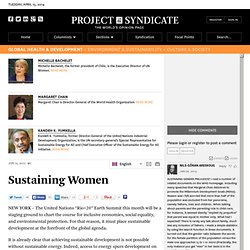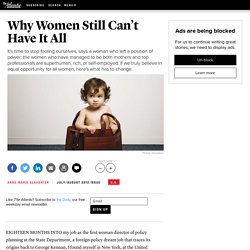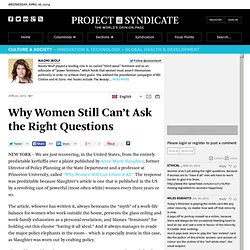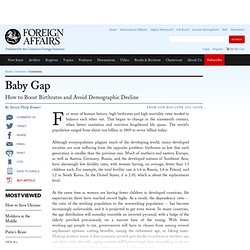

The Geography of Women's Economic Opportunity - Jobs & Economy. At the APEC Summit this past September, Secretary of State Hillary Rodham Clinton argued that women are a great untapped economic resource.

"There is a stimulative and ripple effect that kicks in when women have greater access to jobs and the economic lives of our countries," she told the delegates there. Five Surprisingly Good Places to Be a Woman - By David Kenner and Uri Friedman. When we think about the best places in the world to be a woman, Northern Europe typically springs to mind.

And, indeed, countries such as Finland, Iceland, Norway, and Sweden are perennial heavyweights in rankings of gender equality. Sweden, for goodness' sake, offers women (fine, men too) 480 days of paid maternity leave -- at 80 percent of salary -- which can be taken at any point until the child is 8 years old. The Worst Places to Be a Woman - By Valerie M. Hudson. "Sustaining Women" by Kandeh K. Yumkella , Michelle Bachelet and Margaret Chan. Exit from comment view mode.

Click to hide this space NEW YORK – The United Nations “Rio+20” Earth Summit this month will be a staging ground to chart the course for inclusive economies, social equality, and environmental protection. For that reason, it must place sustainable development at the forefront of the global agenda. It is already clear that achieving sustainable development is not possible without sustainable energy. Indeed, access to energy spurs development on many levels – not least in terms of women and their health, safety, and autonomy. Recognizing this, the UN has declared 2012 the Year of Sustainable Energy for All, and UN Secretary-General Ban Ki-moon has launched a global initiative to achieve three ambitious goals by 2030: universal access to modern energy services, a doubling of the global rate of improvement in energy efficiency, and a doubling of the share of renewable energy in the global energy mix.
These are global issues. Why the Gender Gap Won't Go Away. Ever. by Kay S. Hymowitz, City Journal Summer 2011. Kay S.

Hymowitz Why the Gender Gap Won’t Go Away. Ever. Women prefer the mommy track. How Our Brains Turn Women Into Objects. Rebekah Brooks and Ina Drew: When Women in Power Are Punished - Business. Magazine - Why Women Still Can’t Have It All. The culture of “time macho”—a relentless competition to work harder, stay later, pull more all-nighters, travel around the world and bill the extra hours that the international date line affords you—remains astonishingly prevalent among professionals today.

Nothing captures the belief that more time equals more value better than the cult of billable hours afflicting large law firms across the country and providing exactly the wrong incentives for employees who hope to integrate work and family. Yet even in industries that don’t explicitly reward sheer quantity of hours spent on the job, the pressure to arrive early, stay late, and be available, always, for in-person meetings at 11 a.m. on Saturdays can be intense.
Indeed, by some measures, the problem has gotten worse over time: a study by the Center for American Progress reports that nationwide, the share of all professionals—women and men—working more than 50 hours a week has increased since the late 1970s. Revaluing Family Values. Business - Lori Gottlieb - Why There's No Such Thing as 'Having It All'—and There Never Will Be. Women can't have everything they want all of the time.

Neither can men. Who ever thought otherwise? "Why Women Still Can’t Ask the Right Questions" by Naomi Wolf. Exit from comment view mode.

Click to hide this space. The Recession Was Sexist (So Is the Recovery) - Jordan Weissmann - Business. Men and women lived through separate recessions.

Now, women could be at a disadvantage as they experience a separate recovery. Baby Gap. For most of human history, high birthrates and high mortality rates tended to balance each other out.

That began to change in the nineteenth century, when better sanitation and nutrition lengthened life spans. The world's population surged from about one billion in 1800 to seven billion today. Although overpopulation plagues much of the developing world, many developed societies are now suffering from the opposite problem: birthrates so low that each generation is smaller than the previous one. Much of southern and eastern Europe, as well as Austria, Germany, Russia, and the developed nations of Southeast Asia, have alarmingly low fertility rates, with women having, on average, fewer than 1.5 children each. Jenny Turner · As Many Pairs of Shoes as She Likes: On Feminism · LRB 15 December 2011. "Women on the Verge of an Economic Breakthrough" by Heidi Hautala.
Exit from comment view mode.

Click to hide this space. Uruguay: First to Ratify Domestic Workers Convention. (New York) – Uruguay’s move to be the first country to ratify the international Domestic Workers Convention brings long overdue protections closer to reality for millions of women and girls worldwide, Human Rights Watch said today. The treaty, which extends core labor rights to an estimated 50 to 100 million domestic workers, will come into legal force when it is ratified by two countries. Governments, trade unions, and employers’ organizations that make up the International Labor Organization (ILO) overwhelmingly voted to adopt the Domestic Workers Convention – ILO Convention 189 Concerning Decent Work for Domestic Workers – on June 16, 2011.
Women as Breadwinner: Black Women Already Fill Role in Family. "The Female Economy" by Nena Stoiljkovic. Exit from comment view mode. "Power to Asia’s Women" by Vishakha N. Desai , Astrid S. Tuminez and Gerald Rolfe. Exit from comment view mode. Click to hide this space.